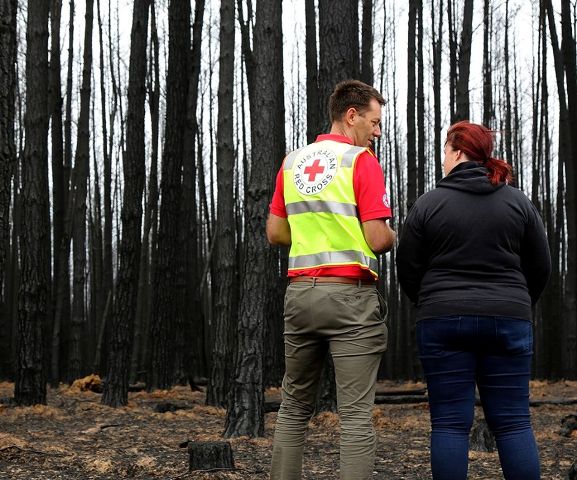 Bushfire crises are likely to be a recurrent feature of Australia’s circumstances in the future, affecting not just Australia but the wider world. The future is now. [photo: Australia Red Cross]
Bushfire crises are likely to be a recurrent feature of Australia’s circumstances in the future, affecting not just Australia but the wider world. The future is now. [photo: Australia Red Cross]
[This is an excerpt from an opinion piece in The Round Table: The Commonwealth Journal of International Affairs.]
While Australia has a long history of bushfires, what is unusual is that the fire season began much earlier this time, with more intense and widespread fires than in the past. The fires of 2019–20 are the worst in recorded history. The Bureau of Meteorology in Australia says 2019 was the hottest year on record. Large parts of Australia have been experiencing drought, further exacerbating the risk of fires. A group of retired fire chiefs warned in April 2019 that Australia would face a bushfire crisis the following summer.
Given the contemporary focus on climate change, the assumption in much of the world is that Australia’s bushfire crisis is another manifestation of extreme weather being caused, or at least exacerbated, by global warming. Prime Minister Scott Morrison of the ruling centre-right Liberal-National Coalition government denied this initially, later saying that the Coalition’s climate change policy would ‘evolve’. In November 2019 Michael McCormack, leader of the rural-based National Party and deputy prime minister, had dismissed climate change concerns in relation to bushfires as the ‘ravings of some pure, enlightened and woke capital city greenies’, also described as ‘inner-city raving lunatics’.
The Coalition government has suffered politically as a result of the bushfire crisis. The first Newspoll for 2020 had Anthony Albanese, the leader of the federal Labor Opposition, ahead of Morrison as preferred prime minister (43 to 39 per cent). Morrison’s judgement in proceeding with a family holiday in Hawaii in December, when the fires were raging, appeared flawed. Although the prime minister cut his holiday short, he seemed unsure of himself when he returned, encountering hostility in areas affected by bushfires.
In any event, the primary responsibility for dealing with bushfires lies with the states. Premiers Daniel Andrews (Labour, Victoria) and Gladys Berejiklian (Liberal, New South Wales) appeared more confident and effective in leading the responses in their respective states than did Morrison at federal level. In the Victorian case, lessons had been learnt through the royal commission established to look into the bushfires of Black Saturday in February 2009. For example, ‘evacuate now’ replaced the previous ambiguous ‘stay or go’ advice when a major bushfire threatened lives.
While the federal government has a secondary role in relation to bushfires, Morrison has enlarged his government’s contribution. Apart from Royal Australian Navy assistance with evacuations from East Gippsland, Morrison also arranged for 3000 reservists from the Australian Defence Force to assist in fire recovery. He has also promised a federal enquiry into fire management issues.
A bigger issue is whether Australia will modify its policies on climate change in the light of this crisis. Even though Australia is the highest per capita carbon emitter among the developed countries, the Coalition government has been notable for its cautious policies on climate change, acting as a ‘spoiler’ to some extent at the recent climate change conference in Madrid. Despite urgings from Malcolm Turnbull, the previous Coalition prime minister, and other advocates of more ambitious policies, there has been no sign that the Australian government will change its position. It has approached the current situation as one of ‘political management’, avoiding provocative statements in favour of its climate change policies.
Present indications are that the federal government will approach the bushfires crisis as one of achieving better fire management. Having a royal commission or major public enquiry will buy time in this respect, even though, as one bushfire expert pointed out, there have been some 57 enquiries since the Black Friday fires in Victoria in 1939. The government’s hope would be that an enquiry would reduce the pressure for modifying its climate change policies. There is nevertheless an issue in developing policies that might facilitate more effective federal involvement in combating bushfires. Every sign is that this issue will not go away. Bushfire crises are likely to be a recurrent feature of Australia’s circumstances in the future, affecting not just Australia but the wider world through adverse weather patterns and exacerbating global warming. The future is now.
Derek McDougall is the Professorial Fellow, School of Social and Political Sciences, University of Melbourne, Melbourne, Australia.



